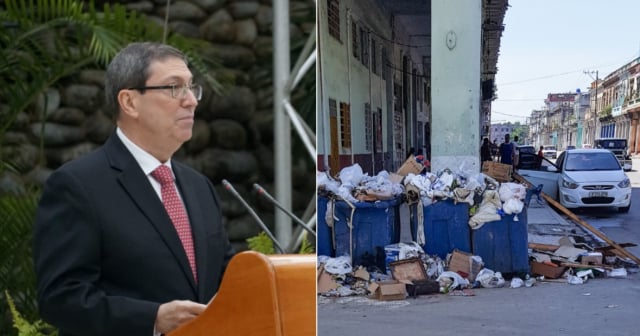The Cuban regime insisted this Saturday on its idea that the United States embargo prevents it from importing necessary medical equipment and medications for cancer treatment, a justification that has been repeatedly challenged with data by the government of that country.
The one responsible for raising again the discourse of the "blockade" as the cause of the lack of medical care for Cubans was the Vice Prime Minister, Inés María Chapman Waugh, who did not hesitate to blame the United States for the deficiencies of the Island's Public Health system, practically collapsed due to the lack of investments from a regime that prioritizes the construction of hotels for international tourism over the welfare of its citizens.
On a "working visit" to Banes, Holguín, the deputy to the National Assembly of People's Power (ANPP) for that territory "checked the performance of various aspects in the economic and social order," according to the National TV News.
In front of those gathered and with his characteristic tone of sweetness, Chapman Waugh referred to the U.S. "blockade" as responsible for the lack of medical care for cancer patients or those in need of pacemakers.
“We all have cases of people with cancer for whom the medication is not available, and help has been requested from the government of the United States, but aid has been denied. Or people who need a pacemaker, or need some other device for their problems, or people who need surgery and the resources are not available here in the territory… That is to say, the blockade is very cruel, very cruel, because it directly affects everyone,” he said.
Echoing the speech prepared by the Ministry of Foreign Affairs (MINREX) to denounce "the blockade," the Vice Prime Minister went further and accused the United States of refusing to sell food to the Cuban government.
Bruno explained it: sometimes there were some possibilities that some North American farmers would sell us chicken in Cuba. Do you remember, right? Well, they have restricted even that. Not even that. They have been limiting it. It is something very selfish, very cruel, but that is what is happening to us. Therefore, we have to look for all the resources we have within the country to produce more ourselves,” said Chapman Waugh, also insisting on the idea that the problems of Cubans “have solutions at the municipal level.”
Experts at blaming anyone but themselves, the Cuban regime has no shame in repeating its lies over and over again, despite the overwhelming evidence.
The United States embargo has exceptions for food and medical items.
In July 2023, the U.S. government responded to Havana's accusations regarding the embargo and stated that it was indeed possible to import medicines and food to Cuba from that country.
"The U.S. embargo on Cuba allows the export of U.S. medical products, as well as other items to support the Cuban population," recalled the Washington Embassy in Havana in a Twitter thread.
In that regard, he clarified that since the beginning of 2023, Washington had approved almost 900 million dollars in medical exports to Cuba. In 2022, the figure was more than 800 million dollars, double that approved in 2021.
"That the embargo is not used as an excuse for the lack of medical care in Cuba," said the diplomatic mission, after the Cuban Foreign Minister, Bruno Rodríguez Parrilla, stated that U.S. policy was responsible for "the shortage of medicines and the lack of supplies for public health in Cuba."
To support its arguments with data, the Embassy posted the link to the Department of Commerce license, with public information regarding it. It also invited checking the public information on the Department of State's website, where the exceptions to the embargo applied from 2021 by the Office of Foreign Assets Control (OFAC) are listed, to manage the shipment of humanitarian supplies to Cuba.
These exceptions include food, medicine, and goods considered humanitarian aid. "So no, the embargo is not a 'blockade' nor the reason why Cuban citizens do not have access to medications," concluded the Embassy.
A month later, the diplomatic mission assured that food and medicines from its country arrived daily in Cuba. "Did you know that in June alone, Cuba imported 27,631 tons of chicken from the United States? Food and medicines arrive daily from the United States to Cuba," the Embassy posted on its social media.
In March 2022, amid the worsening crisis caused by the coronavirus in Cuba, the United States urged institutions and civil society actors to use the officially designated channel to channel humanitarian aid and send food and medical equipment to the Island.
"The State Department urges individuals, organizations, and banks to contact the Humanitarian Mailbox for Cuba (CubaHumanitarian@state.gov). Our team is a great resource for facilitating the export and donation of humanitarian goods to Cuba or answering any questions," stated the U.S. embassy in Cuba.
In addition, the State Department insisted that the United States government always expedites requests to export medical or humanitarian supplies to Cuba. "Through the Departments of Commerce, Treasury, and Transportation, there are many options available to expedite the delivery of humanitarian goods to Cuba," it noted.
In recent days, the U.S.-Cuba Economic and Commercial Council (USCTEC) highlighted that humanitarian donations made by organizations from the United States to Cuba increased this year compared to the previous year and reached the highest figure since 2014.
The registered donations include, among others, items such as food, medical supplies, clothing, and reading materials. So far in 2024, the amount of these donations totals more than 38 million dollars (US$38,907,503.00). The statistics do not include donations or personal deliveries (made by travelers on flights and through third countries).
What do you think?
COMMENTFiled under:
